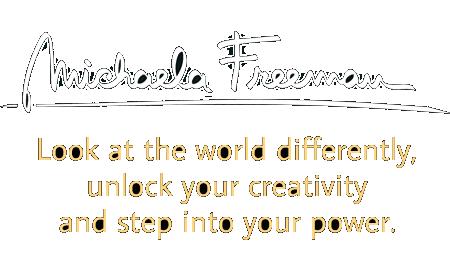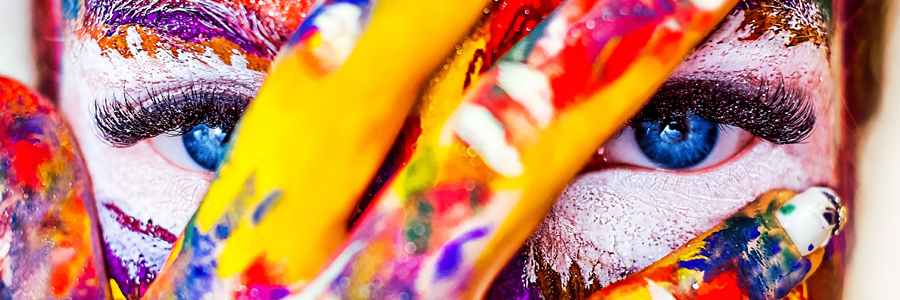Creativity consulting gradually developed from my own career into various lectures, creativity coaching, and courses. Since 1996, long before it became a buzzword, I spent time studying creativity as a process, along with practicing it. There are inherent mechanisms creative people use that can and should be taught to others.
Creative Thinking Can Be Trained
Our general understanding of creativity is often distorted. Given the amount of advertising for creative projects, creativity would seem to involve cutting colored papers and using crayons. For me, creativity means quick and efficient problem solving, out-of-the-box thinking, innovation in business and smart design. Artists and craftsmen use their creativity every day and without a doubt they are masters. But they’re not the only ones who think creatively – or who could, if properly trained.
Creativity Coaching Focuses on Experiential Learning
Creativity coaching is true hands-on training because creativity enters our internal world through sensual experience, rather than intellectual discourse. Reading about it probably will not make you more creative, although smelling a flower might, as may tasting a new flavor, hearing a favorite song, taking a brisk morning run or visiting the zoo. Inspiration works through associations and in a lateral manner, rather than top down, bottom up or upon demand. This may seem frightening or even dangerous to our ‘one-track mind’ that values plans, graphs and timelines.
When creativity experts urge us to go back to our “inner child” it’s because of the wealth of authentic memories that reside there, as well as the fact that children primarily use the correct and natural form of experiential learning – until we pack them off to school. Be very careful about telling a child “don’t do that, keep that out of your mouth” or “hurry up, we don’t have time for that.” Experiences challenge the status quo. They hold the mirror for us saying “Who are you, really?” and “So, are you going to jump or not?” Knowledge in terms of information helps us interpret our world, but experience helps us know it. What we learned from school and books helps get oriented or think up a smart solution, but experience gives us the courage to take the next step.
Unblocking Requires Going Deep
Unblocking the creative process inevitably raises existential questions, the big questions, the essential spiritual truths. It’s a challenge and takes us out of our comfort zone, but it’s worth it. It encourages leaps of faith, produces fearless, wholesome and comprehensive approaches to both our dreams and practical goals. Creative methods accelerate and enable (even free) our everyday problem-solving abilities. Basically, rather than hopping on one leg (the one called logic) we open ourselves to using both our legs (logic and intuition). Then we can walk independently… perhaps even run and dance.
Bridging Two Types of Knowledge
I have a network of trusted specialists with whom I collaborate whenever my own skills seem too limited. On one side are business coaches, psychologists and psychotherapists who prefer scientific methods. On the other are healers, alternative therapists and psychics who rely on intuition as a primary tool. Each speaks their own language, unfamiliar to many of us – one the Latin words of diagnoses, the other those Sanskrit words of symbols you may have heard in a yoga class. Over the years, I have managed to learn from both, so I always work to balance our two hemispheres of learning and bring those two essential worlds together.
Creativity Consulting, Courses, Trainings or Lectures
For several years I co-facilitated group creativity courses and they were both valuable and successful. But now I prefer more intimate individual sessions in very limited capacity. I also give lectures, training sessions, coach or consult business teams or interest groups. We aim to identify creative blockages, personal problems that prevent forward motion and may lead toward the inevitable spiritual question of who am I or who are we as a team.
And of course, I provide practical project advice and feedback, another way to open new avenues and opportunities. One specific service is Concept Creation that helps people define their ideas and needs. Once they have a clear mission I can provide or coordinate Content Strategy and Development for presenting their concept to the world. In a consulting format, I can help navigate most any stage of the creative process (brainstorming, research, synthesis, feedback, execution, testing, launching, follow-up, promotion, revision, expansion, realignment) and help individuals or teams move forward.
Making Something from Nothing
Although it may be hard to believe, these processes are essentially the same whether you are writing a book, planning a gallery show, developing a new corporate product or trying to launch a startup. On a smaller scale, they apply to everyday life – from cooking to giving gifts, planting flower beds or throwing fun parties. Creativity simply means making something from nothing. It sounds simple, but can be quite difficult to implement, which is why I believe that people should be properly trained or guided through this process.
So, I made that my personal mission. Here is more about Creativity as a principle and on how it works.
Cover image by Alexandr Ivanov from Pixabay

